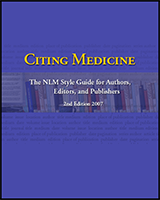From: Chapter 22, Books and Other Individual Titles on the Internet

Citing Medicine: The NLM Style Guide for Authors, Editors, and Publishers [Internet]. 2nd edition.
Patrias K, author; Wendling D, editor.
Bethesda (MD): National Library of Medicine (US); 2007-.
NCBI Bookshelf. A service of the National Library of Medicine, National Institutes of Health.